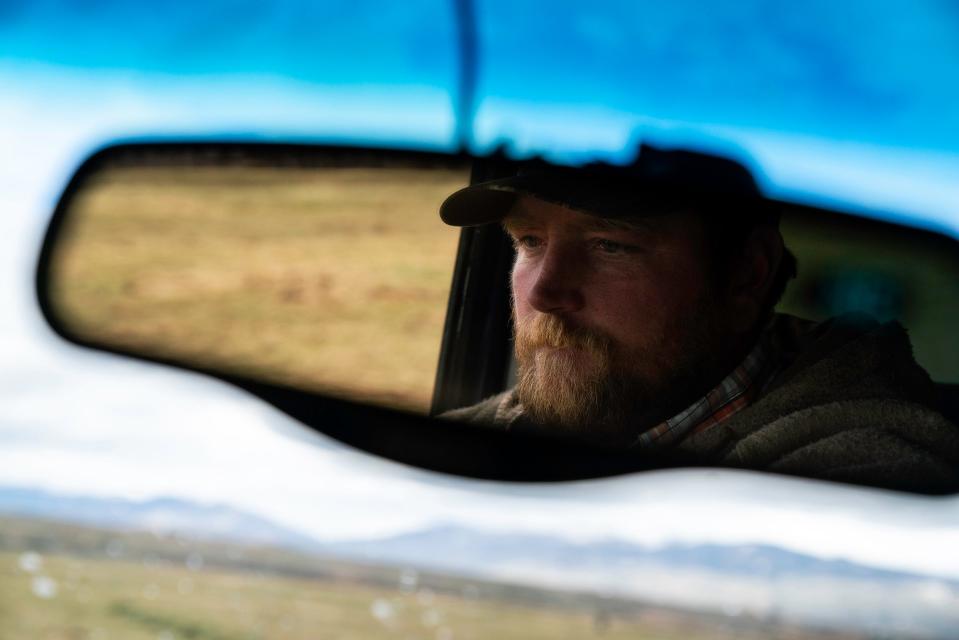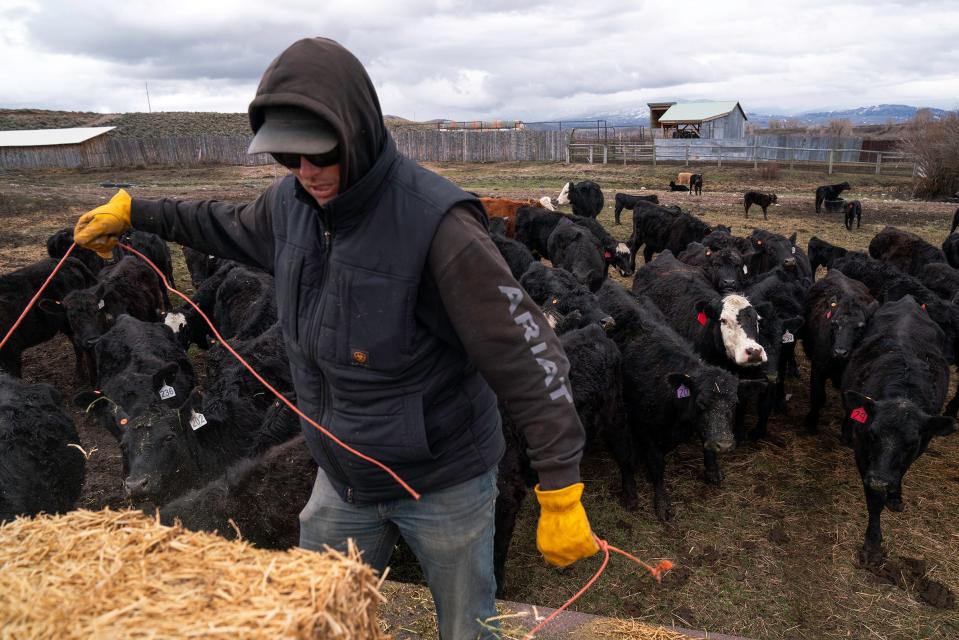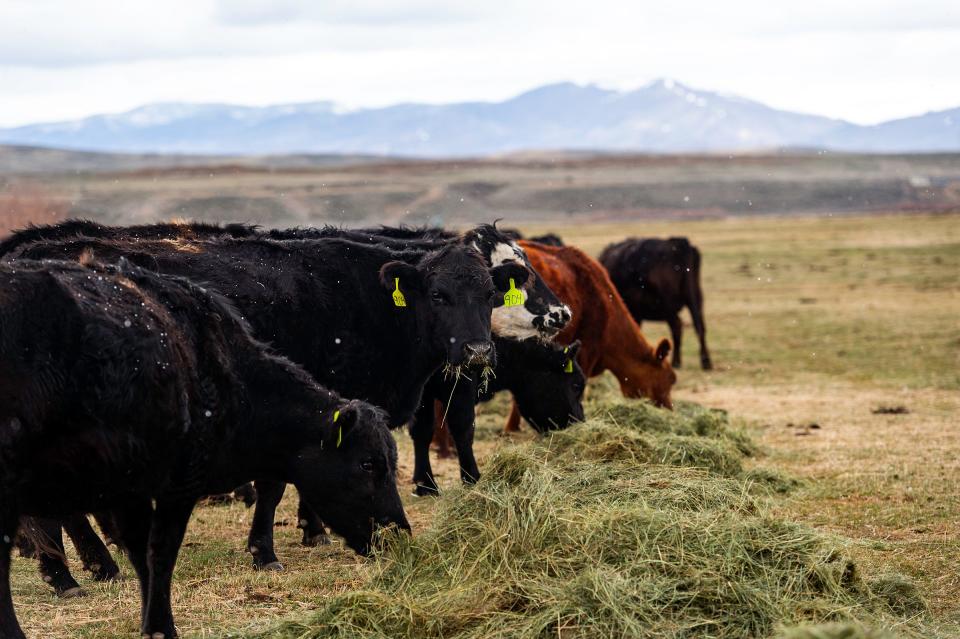'The wolves are smart': Grand County's lone range rider has hands full protecting cattle
- Oops!Something went wrong.Please try again later.
In the first two weeks of night watches, the lone hired range rider in Grand County scared off a wolf or multiple wolves on seven different occasions as the predators prowled among a cattle herd where a string of killings have taken place.
On the night of May 8, the range rider conducted a nightly round from 11 p.m. to 5 a.m., using thermal imaging from vantage points along county roads to check the herd and scan the hillsides for wolves among the 400 acres of sagebrush flats and draws.
Three days later, another yearling was found in a low spot among the sagebrush, with Colorado Parks and Wildlife confirming the animal was killed by a wolf or wolves. The rancher, Conway Farrell, believes the kill happened late at night on May 8 or in the early morning of May 9.
It was the first and only confirmed wolf depredation since the range rider started April 30. Before that, wolves released nearby as part of Colorado's wolf reintroduction program had killed five cattle in the same calving area in 11 days, ending April 28.
"The range rider has been successful to a point," Tim Ritschard, president of the local Middle Park Stockgrowers Association, told the Coloradoan. "Without the range rider, we would have another five or six animals dead.''

'The wolves aren't running away scared; they just walk off'
Ritschard said the range rider patrols seven nights a week and uses cracker shells to scare the wolves when seen.
He said the stockgrowers association wanted the range rider to be able to use lethal force on the wolves if necessary, but the state balked at that idea and the association relented.
The person hired by the Middle Park Stockgrowers Association is a local resident who knows cattle well, Ritschard said. The association asked the Coloradoan not to identify the individual because of safety concerns.
"When the range rider has seen them — and sometimes it's multiple wolves — the wolves aren't running away scared; they just walk off," he said. "The wolves are smart. They know when you are out there and when you aren't. We have the range rider out at night when most of the depredations take place, but the wolves are getting smarter. Right now, we are trying to figure out if we need to adjust our range rider times to keep up with the wolves."
He said without the use of thermal imaging, the range rider would have little chance to detect the wolves, which are distinctive among other wildlife seen because the thermal imaging doesn't pick up the wolves' GPS collars, making it appear the wolves have no neck.
Colorado Parks and Wildlife was giving collar information to Ritschard when wolves were in the area. He said that ended when the agency said the collar on the male wolf that ranchers believe to be responsible for most of the killings stopped working.
Colorado Parks and Wildlife previously said two collars on the wolves aren't working properly.
"Let's just say it proved interesting that we are four months into the release and had the five cattle killed (on Farrell's ranch in April) and all of a sudden the male's collar doesn't seem to be working," Ritschard said.
Ritschard said area ranchers haven't seen wolf pups but believe the pair may have had a litter of pups in the area near where most of the killings have taken place.
Colorado Parks and Wildlife spokespersons have repeatedly said the department has no confirmation of pups being born this spring, but did say it believes two released wolves were denning in the area.

Trouble looms despite efforts to nonlethally protect cattle from wolves
Ritschard said other concerns could spell trouble not only for Farrell, but for the other ranches that dominate the area around Kremmling.
Ranchers like Farrell have been splitting night watch shifts among family and hired hands. Ritschard said between the calving season and other chores, ranchers are busy this time of year and are struggling working day and night.
The Colorado Department of Agriculture has allocated $20,000 toward funding for a range rider in Grand County, and Colorado Parks and Wildlife has given Farrell and other area ranches nonlethal tools to deter the wolves.
But the attacks have continued.
Ritschard said the $20,00 range rider grant is only enough to pay for one range rider and that funding is set to end at the end of the state government fiscal year on June 30.
He said more cattle are being moved from the Colorado River bottom where flows are high to feeding and calving ground near where the wolves have been seen.
"Our big thing is this is one area," said Ritschard, a Middle Park rancher with cattle near previous wolf kill sites. "If we have incidents in more areas, we are going to need more range riders and more money and we're not sure where that money will come from, if we can even find range riders we trust."
On May 13, Colorado Parks and Wildlife Director Jeff Davis for the third time in recent weeks rejected a stockgrowers association request for the state to lethally remove the male and female wolves ranchers believe are responsible for the string of cattle killings in Grand County.
The ranchers say two of the released wolves are putting an undue amount of financial and emotional strain on their operations and families.
Davis has repeatedly insisted the agency will not lethally remove the pair because they are the only known released wolves that have denned. He said removing them, or even just the breeding male, would result in den failure and a setback for the state's wolf recovery plan.
Since the wolves were released in December in Grand and Summit counties, there have been seven confirmed wolf kills of cattle in Grand County and two in southern Jackson County, which abuts Grand County to the north.
Area ranchers also have reported missing cattle, but those cases have not been confirmed to have been wolf kills.
Here is a list of confirmed wolf depredations in Colorado and the amount paid to livestock producers

The below data was provided by Colorado Parks and Wildlife as of May 11, 2024.
There have been 28 confirmed wolf depredations of livestock since December 2021. Total paid out for compensation is $41,406.95, with nine compensation payments pending.
Depredations include injury or death to livestock, including working cattle dogs, and compensation is paid for both:
2024
May 11: 1 yearling cattle. Grand County. Compensation payment pending.
April 28: 1 calf. Grand County. Compensation payment pending.
April 18: 1 yearling cattle. Grand County. Compensation payment pending.
April 17: 3 yearling cattle. Grand County. Compensation payment pending
April 13: 1 calf. Jackson County. Compensation payment pending
April 7: 1 calf. Jackson County. $1,514.00 paid.
April 2: 1 calf. Grand County. Compensation payment pending
Total: 9 depredations, $1,514 paid, eight compensation payments pending.
2023
Dec. 13: 1 calf, Jackson County. Compensation payment pending
Nov. 17: 3 sheep. Jackson County. $489
March 13: 1 working cattle dog. Jackson County. $15,000
Total: 5 depredations, $15,489 paid, one compensation payment pending
2022
Nov. 19: 1 calf. Jackson County. $1,106.09
Oct. 8: 1 calf. Jackson County. $338.62
Oct. 7: 1 calf. Jackson County. $400
Aug. 1: 1 calf: Jackson County. $3,000
May 30: 1 calf. Jackson County. $3,000
May 2: 1 calf. Jackson County. $2,850
April 22: 1 calf. Jackson County. $779.52
March 15: 2 cattle. Jackson County. $1,230
Jan. 18: 3 cattle. Jackson County. $8,647
Jan. 9: 2 working cattle dogs. Jackson County. $1,252.72
Total: 13 depredations, $22,603.95 paid.
2021
Dec. 9: 1 calf. Jackson County. $1,800
This article originally appeared on Fort Collins Coloradoan: Grand County rancher faces another wolf kill despite hired range rider

